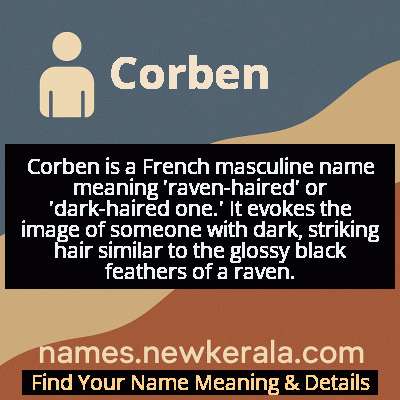Corben Name Meaning & Details
Origin, Popularity, Numerology Analysis & Name Meaning of Corben
Discover the origin, meaning, and cultural significance of the name CORBEN. Delve into its historical roots and explore the lasting impact it has had on communities and traditions.
Name
Corben
Gender
Male
Origin
French
Lucky Number
3
Meaning of the Name - Corben
Corben is a French masculine name meaning 'raven-haired' or 'dark-haired one.' It evokes the image of someone with dark, striking hair similar to the glossy black feathers of a raven.
Corben - Complete Numerology Analysis
Your Numerology Number
Based on Pythagorean Numerology System
Ruling Planet
Jupiter
Positive Nature
Optimistic, inspirational, and creative.
Negative Traits
Scattered, exaggerating.
Lucky Colours
Yellow, gold, purple.
Lucky Days
Thursday.
Lucky Stones
Yellow sapphire.
Harmony Numbers
1, 2, 9.
Best Suited Professions
Arts, writing, communication.
What People Like About You
Creativity, optimism.
Famous People Named Corben
Corben Sharrah
Professional BMX Racer
Multiple BMX World Cup champion and elite level competitor
Corben Henry
Musician/Composer
Noted film and television composer with multiple soundtrack credits
Corben Bone
Professional Soccer Player
MLS midfielder who played for Chicago Fire and FC Cincinnati
Name Variations & International Equivalents
Click on blue names to explore their detailed meanings. Gray names with will be available soon.
Cultural & Historical Significance
The raven's association with wisdom in French folklore and its prominent role in Celtic mythology that influenced French border regions gave the name additional cultural layers. In Brittany and other regions with Celtic heritage, the raven was seen as a magical creature with connections to the otherworld. The name's journey through French linguistic history reflects the evolution of the language itself, from Old French to modern variations. While less common in contemporary France than its English counterpart, Corben maintains a connection to this rich historical tapestry of linguistic evolution and symbolic animal references that characterized much of medieval French naming conventions.
Extended Personality Analysis
Individuals named Corben are often perceived as intelligent, observant, and possessing a natural curiosity about the world around them. They tend to be analytical thinkers who approach situations with careful consideration rather than impulsivity. Their quiet confidence and thoughtful nature often make them excellent problem-solvers who notice details others might miss. Corben's typically exhibit a blend of traditional values with modern adaptability, showing respect for established ways while being open to innovation when it proves valuable.
They often possess strong communication skills and a dry wit that emerges in comfortable settings. While they may appear reserved initially, those who know them well appreciate their loyalty, depth of character, and the steadfast reliability they bring to relationships and professional endeavors. Their combination of observational skills and thoughtful approach to life often makes them successful in fields requiring analysis, strategy, or creative problem-solving. The name's connection to the raven—a bird known for its intelligence and adaptability in nature—seems to reflect in the personality traits commonly associated with those who bear it, creating a harmonious connection between name meaning and character attributes.
Modern Usage & Popularity
In contemporary times, Corben remains a relatively uncommon but distinctive choice for boys, particularly among parents seeking names with French origins that aren't overly popular. The name has maintained steady but low usage in French-speaking regions and among families of French descent in North America. While it hasn't reached the popularity charts in most countries, it enjoys a niche appeal among parents looking for traditional yet uncommon names. In recent years, there's been a slight increase in usage as vintage and less common names gain popularity, particularly those with strong cultural heritage and meaningful symbolism. The name is particularly favored by parents who appreciate its connection to French heritage and the symbolic meaning of the raven, which conveys intelligence and mystery. Its spelling with an 'e' rather than the more common 'i' (Corbin) gives it a distinctive French flair that appeals to modern naming sensibilities seeking uniqueness without being overly unconventional.
Symbolic & Spiritual Meanings
Symbolically, Corben carries deep connections to the raven, an animal rich with metaphorical meaning across cultures. The raven represents intelligence, adaptability, and mystery—qualities often associated with those bearing this name. In many traditions, ravens are seen as messengers between worlds, symbolizing transformation and the ability to navigate different realms of understanding. The dark plumage referenced in the name's meaning connects to concepts of protection, wisdom gained through experience, and the hidden knowledge that emerges from careful observation. The raven's association with prophecy and insight in various mythologies adds layers of symbolic depth, suggesting that Corben embodies someone who sees beyond surface appearances to deeper truths. This symbolic background creates a name that suggests both strength and subtlety, tradition and forward-thinking perspective, making it a choice that carries significant metaphorical weight beyond its literal translation.

